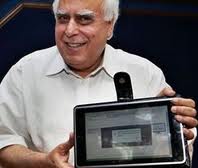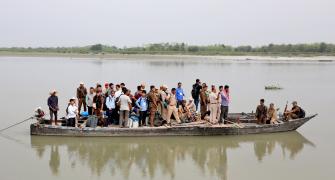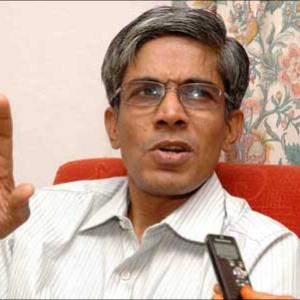HRD Minister Kapil Sibal's unsuccessful efforts to get key legislations on reforms in higher education passed, his push for examination reforms, rise in IIT tuition fees and launch of world's cheapest tablet PC marked the year 2011 in the education sector. None of the important legislations -- Education Tribunal Bill, the Foreign Education Providers Bill and the Copyright Bill -- could be passed in Parliament with repeated disruptions undoing his efforts.
None of the important legislations -- Education Tribunal Bill, the Foreign Education Providers Bill and the Copyright Bill -- could be passed in Parliament with repeated disruptions undoing his efforts.
He also had to face some embarrassing moments in the Upper House with members from both his party and from Opposition either objecting to some provisions in the bills or raising the issue of conflict of interest.
While he was in midst of building a consensus on introducing a single national test of engineering courses in IITs and other technical institutes, former Environment Minister Jairam Ramesh comments about quality of faculty in IITs and IIMs raised his level of discomfiture.
Sibal though was quick to rubbish his remarks, saying if the IITs have not gained the critical mass to change the global scientific discourse, it is because of the "ecosystem" and not because of the faculties.
The record 100 per cent cut-off marks in Delhi University this year also brought to fore the ugly truth of the wide gap between demand for seats in prestigious colleges and the supply.
Even as Sri Ram College of Commerce justified the record cut-off marks for admission to undergraduate commerce course, Sibal sought to reach out to the parents, describing the cut-off as "irrational".
Delhi University was also asked by the ministry to implement the 27 per cent reservation for OBC students in "letter and spirit", amid reports that it is not being strictly followed.
In February, Jamia Milia Islamia was granted minority institution status by the National Commission for Minority Educational Institutions, a first for any central university, allowing it to reserve up to 50 per cent seats for Muslims.
During this fiscal, the education sector got a 24 per cent hike in budgetary allocation at Rs 52,057 crore (Rs 520.57 billion) to take forward ambitious programmes like universalising secondary education and increasing enrolment ratio in higher education.
However, some surveys came up with some mixed trends on the quality and access to education in the country.
While an annual State of Education Report 2010 of NGO Pratham said only 65.8 per cent of Class I students could recognise numbers from 1 to 9, National University of Educational Planning and Administration (NUEPA) in its report for 2009-10 said primary education witnessed improvement due to Sarva Shiksha Abhiyan programme.
Keen on enhancing quality of education, Prime Minister Manmohan Singh in his year's Independence Day speech announced his government's decision to appoint a commission to make recommendations in this regard.
The ministry as per its efforts to expand education through information technology unveiled the world's cheapest tablet PC, priced at around Rs 1,200, for students in October.
The
The year gone by saw a rise in IIT tuition fee with the IIT Council giving its nod to conditional fee hike of Rs two lakh per annum from 2013 for students who are not from weaker sections.
However, Sibal said the extra money will not be collected till they secure employment even if it takes 10 years. Under the 'pay back' scheme, increase in fees will not be charged in the academic year.
The Council also endorsed a common entrance test for IITs/NITs, state government-run and private engineering colleges throughout the country from 2013, often described as a dream mission by the minister himself.
As per the T Ramaswami committee, which went into the subject, the single test would be a kind of examination where weightage would be given to Class XII marks of students and a Scholastic Aptitude Test-kind of test.
IITs also declared a minimum required percentage which a candidate has to score in each subject in their entrance tests to help them prepare accordingly and avoid any confusions.
From 2012 candidates must score at least 10 per cent in each subject and 35 per cent in aggregate in order to be in the common rank list.
With several seats in the new IIMs going vacant, the IIMs also decided to share admission information among them and post individual admission criteria in their websites.
Further, the prestigious B-schools decided to explore possibilities of offering programmes in non-core areas like health, education and infrastructure, in a path breaking initiative.
The government also gave its nod to some key decisions such as the establishment of the much talked about National Commission of Higher Education and Research (NCHER) and approving a private-public partnership pattern for setting up of 2,500 model schools across the country.
The government's ambitious National Vocational Education Qualification Framework programme, which aims to feed the industry with skilled hands, was launched for polytechnic and engineering colleges.
There was an increasing trend of collaborations between Indian universities with foreign varsities during the year, which saw the first Indo-US higher education summit being hosted in the US in October.
Overseas players investing in education infrastructure in India also got a boost following the government's decision to exempt this sector from restrictions imposed in the FDI policy.
A concept of meta-university was also unveiled during the year under which a IIT Kanpur student will be able to enrol for a course in ancient history from JNU or a mathematics student from IIS will be able to pursue a course in comparative literature from Jadavpur University simultaneously.
The first Common Management Admission Test (CMAT) for admission to all management institutes approved by AICTE was also announced during the year, addressing the issue of physical, mental and financial stress on the students appearing in multiple entrance exams.






